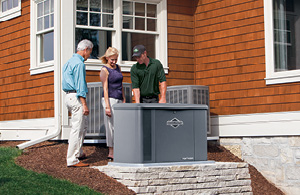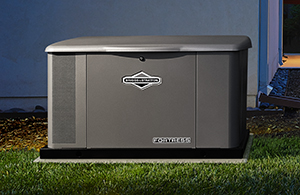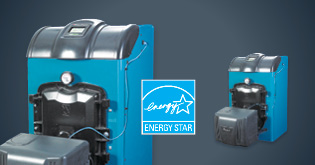
Here’s why you need a backup generator.
 Buying a backup generator doesn’t come to mind until the power goes out. Power outages happen most often during hurricanes, snowstorms, and utility blackouts, but then it’s already too late!
Buying a backup generator doesn’t come to mind until the power goes out. Power outages happen most often during hurricanes, snowstorms, and utility blackouts, but then it’s already too late!
While many outages last at most a whole day, some instances can last much longer. That means your refrigerator isn’t keeping your food fresh, you can’t do laundry, and many other basic household features we usually take for granted are put on hold.
That’s why purchasing an emergency backup generator is not a bonus — it’s a necessity. With an emergency backup generator, you can have peace of mind knowing that:
- You’ll be able to live comfortably through a power outage
- You can keep crucial household systems like refrigeration and septic systems running
- Your life doesn’t have to stop because of a power outage
What kind of generator will fit your needs?

There are many kinds of emergency generators, each of which are designed for specific circumstances. We’ve listed the two varieties of generators available below — contact us to find out which is the right one for you.
Standby/whole-house generator.
- These generators are a permanent installation outside the home. Typically powered with natural gas or propane, standby/whole-house generators will automatically turn on when the power goes out, and they automatically power off when electricity is restored.
- While the more expensive option, it is the most comprehensive and reliable generator type to ensure your life doesn’t have to stop during a power outage.
Installing a standby/whole-house generator.
- Installing a standby/whole-house generator requires permits and adherence to building codes. That is why you’ll need these types of generators installed by a professional.
Benefits of a standby/whole-house generator.

- Standby/whole-house generators offer benefits beyond just keeping the lights on.
- When the power goes out, many crucial appliances and devices will turn off, including but not limited to refrigerators, medical hardware, and heating services. With the reliability that standby/whole-house generators offer, you can keep your family safe while knowing the pipes won’t freeze, your food will stay fresh, and you can live in relative comfort while the power is out.
- These generators also make your home more attractive to home buyers. Real estate agents could use a standby/whole-house generator as a selling point if you are selling your home.
Portable generators.
- Typically powered with diesel or gasoline — though propane- and natural gas-powered models do exist — portable generators could be an option for those who only require generator power for short periods of time.
- Portable generators are less expensive than their standby/whole-house counterparts, but, their lack of safety features and lower capacity could mean you’re trading security and convenience to save money.
How portable generators work.
- Portable generators are designed to give power to individual appliances and devices, as opposed to the standby/whole-house models installed into the electrical system of your home.
- They require a transfer switch to be installed in your electrical grid, which safely allows for power to be drawn from the generator automatically in the event of an outage.
- NOTE: Never plug your portable generator into an electrical outlet — doing this could create a surge that creates unsafe conditions for utility workers.
Portable generator benefits.
- As stated above, portable generators are less expensive than standby/whole-house generators. And while there is convenience in the fact that they are portable, there are concerns with safety and security during a power outage that make them a less attractive option.
Safety concerns.
- Portable generators must never be plugged into a standard wall outlet. That is because doing so could cause “backfeeding,” a phenomenon where a surge of power is forced back into the electrical grid, causing a potential risk to utility workers servicing electrical lines near your home.
- These models must also be stored outside the home in a dry place. Most models emit carbon monoxide (CO) while operating, which can create a safety issue for you and your family.
Additional considerations.
Whether you decide to purchase a standby/whole-house or portable generator, here are a couple more factors to consider:
- Where You Are - Certain areas of the country are more prone to power outages than others. For instance, if you live in an area that loses power often, you might need a standby/whole-house generator.
- Home Size - The amount of electricity your home requires is a major factor in choosing a generator. If you have a larger home, a standby/whole-house generator would be the better option for you.
- Appliances and Devices - If your home contains many appliances and devices, or those that draw a lot of power, you’ll find a standby/whole-house generator that would best suit your needs.
Meenan’s licensed and bonded technicians are trained to assess the specific generator needs for your home and devices.
Call (516) 783-1000 (New York) or (215) 943-3500 to schedule an assessment with Meenan today!
Meenan and your generator maintenance.
Whether you own an air- or liquid-cooled standby/whole-house generator, Meenan has its maintenance covered.
Air-cooled standby generators.
You can schedule either annual or twice-a-year tune-up services for your air-cooled standby generator. As home service experts, our 16-point maintenance plan covers the following:
- Drain and replace engine oil
- Replace the engine oil filter
- Replace the engine air filter
- Check and clear all air inlets and outlets
- Check battery posts, cables, and chargers for loose connections, corrosion, and damage
- Check the generator wiring for loose connections, corrosion, and damage
- Check and clean the spark arrester
- Check engine fan belts for wear or damage
- Clean and replace engine spark plug (if necessary)
- Check valve clearance
- Clean and check the generator for corrosion, insect and/or rodent damage
- Check all electric and gas conduits
- Start and operate the system to check for leaks, loose connections or components, and abnormal operating conditions
- Initiate an automatic start and transfer load (customer approval required)
- Adjust the frequency and voltage (if necessary)
- Return the unit to stand-by setup for full emergency operation
Liquid-cooled standby generators.
Meenan also services liquid-cooled standby generators using our comprehensive 19-point maintenance tune-up to ensure your unit works when you need it. This maintenance plan covers the following:
- Drain and replace engine oil
- Replace the engine oil filter
- Replace the engine air filter
- Check and clear all air inlets and outlets
- Check battery posts, cables, and chargers for loose connections, corrosion, and damage
- Check the generator wiring for loose connections, corrosion, and damage
- Check and clean the spark arrester
- Add fluid, flush, and refill every 200 hours of operation
- Clean the oil cooler
- Clean the cooler system
- Check engine fan belts for wear or damage
- Clean and replace engine spark plug (if necessary)
- Check valve clearance
- Clean and check the Generator for corrosion, insect and/or rodent damage
- Check all electric and gas conduits
- Start and operate the system to check for leaks, loose connections or components, and abnormal operating conditions
- Initiate an automatic start and transfer load (customer approval required)
- Adjust the frequency and voltage (if necessary)
- Return the unit to stand-by setup for full emergency operation



.jpg)
.jpg?sfvrsn=38eb02bb_5)